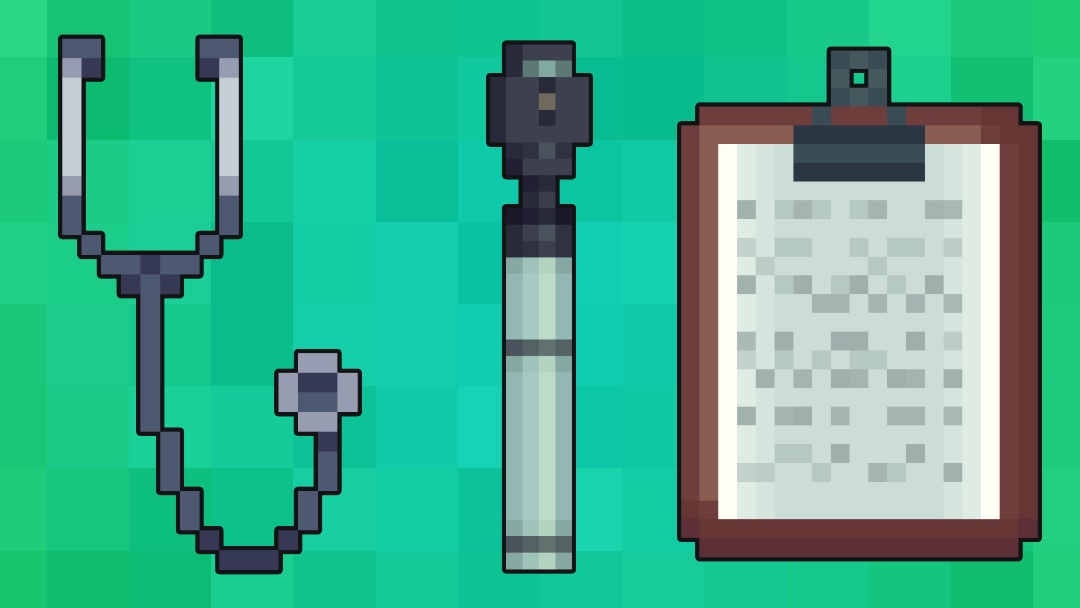- 📖 Geeky Medics OSCE Book
- ⚡ Geeky Medics Bundles
- ✨ 1300+ OSCE Stations
- ✅ OSCE Checklist PDF Booklet
- 🧠 UKMLA AKT Question Bank
- 💊 PSA Question Bank
- 💉 Clinical Skills App
- 🗂️ Flashcard Collections | OSCE, Medicine, Surgery, Anatomy
- 💬 SCA Cases for MRCGP
To be the first to know about our latest videos subscribe to our YouTube channel 🙌
Objective Structured Clinical Exams (OSCEs) are the ‘practical’ exams of medical school. They can seem really difficult and stressful, but with enough practice, you can score well.
We’ve put together some top tips for passing OSCEs. We hope these tips are helpful and make you feel a little less worried. Good luck!
What is an OSCE?
An Objective Structured Clinical Examination (OSCE) is a common method of assessing clinical competence in medical education.
An OSCE assesses performance in a simulated clinical environment, not in an actual clinical environment. In contrast, workplace-based assessments (e.g. the mini-CEX) occur in the actual clinical environment.
For more information, see our guide to OSCEs.
What do you need to know?
It might seem obvious, but make sure you know which examinations and procedures you’re expected to know and what you’re supposed to be doing in them.
Check with your university for mark schemes and example examination formats.
Before you begin to study, it’s important to address your areas of weakness and target these early on. Practising skills that you’re not yet proficient with can be daunting, but keep in mind the end goal and remember that the study period is the best time to learn from your mistakes.
Practice makes perfect
Grab a fellow medic/friend/flatmate and practice regularly until your examinations are fluent and confident.
Exam nervousness can affect your performance, so it’s better to be overprepared than under. If you can’t find medics to practice with, don’t fret. Your non-medical family members or friends often make the best ‘patients’ and can offer you sincere feedback about your manner, overall approach and how comfortable they felt in the simulated situation.
If your medical school allows you to practice with its equipment and anatomical models, take advantage of these opportunities. It is often the same equipment used in the real OSCEs!
Practice scenarios are useful when preparing for OSCEs. The Geeky Medics OSCE Station Collection has over 1,300 scenarios to practice with friends or individually.
Timing
Remember to always practise with a timer as the minutes fly by in the real thing.
Check the exact timings of specific OSCE stations with your university. For example, you may get a full 8 minutes for an examination but 6 minutes with 2 minutes of questions for a history-taking station.
Give great feedback
When practising with peers, seeking and giving constructive feedback is essential.
Constructive feedback aims to provide helpful suggestions, criticism or insights in a positive and supportive manner. It is important that you always give actionable advice for improvement; key areas to highlight may include communication skills, physical examination technique, clinical reasoning, professionalism and time management.
Giving constructive feedback
One method for giving constructive feedback is by using Pendleton’s rules:
- Start with the individual playing the doctor and ask them to highlight the positive aspects of their performance (“What went well?”)
- Next, the examiner(s) and patient offer their perspectives on what the doctor did well
- Ask the doctor to reflect on areas for improvement in their approach or technique (“What would you do differently next time?”)
- The examiner and patient contribute their observations on aspects the doctor could improve.
Feedback should be specific, focusing on behaviours observed during OSCE practice. Suggestions for improvement should be practical and achievable.
Follow the dress code
Dress professionally and according to your local dress code – it might not get you extra marks, but it does help you make a good first impression.
Remember to tie up long hair, roll sleeves up above the elbows and remove any jewellery on the wrists or fingers.
Details, details, details
Before entering each station, you will get ‘reading time’ to read through the upcoming scenario. Take a deep breath and make sure that you read the instructions carefully before you enter the station.
When stressed, it’s easy to mix up things like an upper limb instead of a lower limb neurological examination.
Pay attention to directions such as ‘only examine’ or ‘you do not need to…’. It can be helpful to run through the steps in your head, with any modifications suggested by the prompt, and prepare for how you’re going to approach the scenario once the timer starts.
And so it begins…
Always begin and end a station by washing your hands! This is good clinical practice and gives you vital and easy marks.
Memorise your opening script until it becomes second nature. This should consist of greeting the patient, introducing yourself, checking their identity, describing the procedure/examination and gaining their permission to continue. Easy marks, but important stuff.
Structure is everything
Develop an order you are comfortable with and can remember for examinations. For details, check out our OSCE clinical skills guides.
For history taking, a general structure applies:
- Presenting complaint
- History of presenting complaint
- Past medical history
- Drug history
- Family history
- Social history
- Systemic enquiry
- Ideas, concerns and expectations
It’s crucial to bear in mind that the sequence of history might vary during a consultation, as patients do not adhere to our structure.
Ensure that you’re attentive to the patient’s responses and adapt accordingly. For instance, if the patient mentions, “My father passed away last year”, take a moment to respond empathetically; try to avoid becoming overly fixated on the structure to the extent that you simply continue with “Okay, and do you consume any alcohol?”.
On that note, exercise caution to refrain from filler words such as “cool” or “okay great”. When used inappropriately, they’re likely to detract from the clarity and professionalism of your communication.
It’s easier to listen when you’re taking things at a steady pace. It will also allow your examiner to mark you correctly and give you time to develop rapport with the patient – so try not to rush!
Take a look at our more specific communication skills guides for more details.
Speak enough to convey wisdom, but don’t dilute its potency
In moments of panic, it can be easy to say anything that comes to mind. When suggesting differential diagnoses, try to list only the options consistent with the patient and their given history. Three differentials are usually sufficient – listing too many or too few can suggest poor clinical reasoning.
When thinking about investigations, always start with bedside investigations, moving onto things you’d order, like blood tests or imaging. Consider what is genuinely relevant to the patient’s case rather than reciting an exhaustive list of investigations that you’ve learned by heart.
Fake it ‘til you make it
You may not feel very confident during your OSCE, but pretend you are!
Stand up straight, smile when appropriate, and speak loudly and clearly—being too apprehensive can give the impression you don’t really know what you’re doing and make the patient nervous, too.
Manners cost nothing
Always be polite, empathetic, and honest with your patients. Listen to them carefully and let them speak. Thank them and the examiner at the end of the station. A significant amount of marks are often awarded just for demonstrating these generic communication skills, so don’t neglect them!
Don’t just stand there…think!
Once you finish your examination, you may have some spare time; don’t let this go to waste. Look around to see if there’s any equipment in the room you’ve not used.
If you remember something you missed, feel free to go back and do it—you’ve only got marks to gain.
Keep calm and carry on, but don’t waste a good mistake…
It can be easy to just wipe all memories of a bad OSCE out of your brain. However, if you write those errors down, you can review them for your next exam and ensure you don’t repeat the same mistakes.
Talking to your coursemates about their experience can help, too – no one said that you can only learn from your own mistakes.
Get a good night’s sleep
The night before any exam can be stressful, but try and relax, unwind and get a good night’s sleep. You’ll be able to concentrate much better if you’re well-rested.
Cramming the night before any exam tends to do more harm than good. Consistent revision over days yields much better results than studying intensely in the last 24 hours. Therefore, have faith in your preparation until the day of the exam.
ABC…don’t ever forget glucose
Make sure you have something to eat or bring food to OSCE – depending on your university rules, you may have to ‘quarantine’ before and after the OSCE whilst other students complete the stations – it’s not a good time to be hungry!
Good luck!
Useful resources for OSCEs
- Free OSCE guides
- Geeky Medics OSCE Stations Bank (1300+ stations)
- Geeky Medics OSCE Revision Guide
- Geeky Medics OSCE Flashcards (3000 flashcards)
- Geeky Medics App (OSCE revision on the go)




